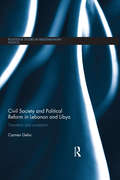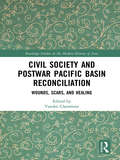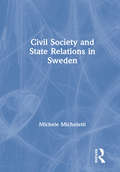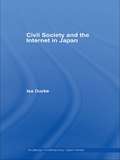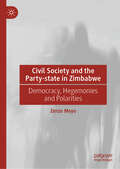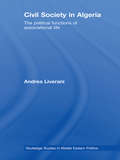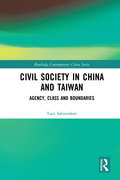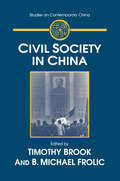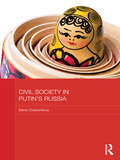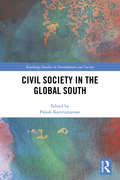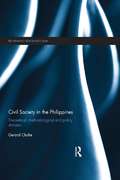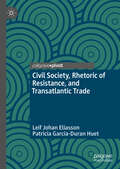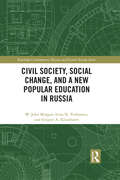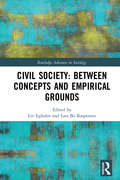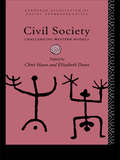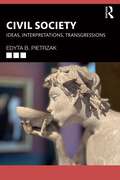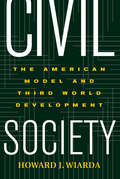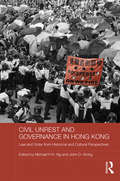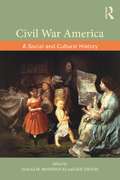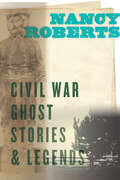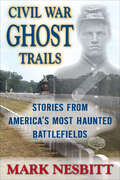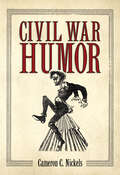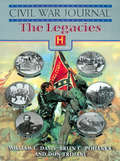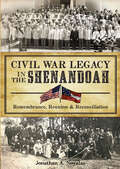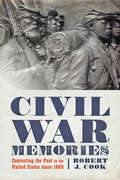- Table View
- List View
Civil Society and Political Reform in Lebanon and Libya: Transition and constraint (Routledge Studies in Mediterranean Politics)
by Carmen GehaLebanon and Libya have undergone critical political events in recent years. However, demands for reform from civic institutions during these transitions have not led to concrete political decisions. Civil Society and Political Reform in Lebanon and Libya reveals the deeply-entrenched historical patterns and elements of continuity that have led to path dependent outcomes in the political transitions of both countries. Motivated by personal experiences as an activist in Lebanon, the author draws together a wide range of data from participant observations, nation-wide surveys, interviews and focus groups in a careful analysis of these two civil society-led reform campaigns. The study demonstrates how the combination of weak states and power-sharing agreements marginalizes civic organisations and poses institutional constraints on the likelihood of reform. Written by an active participant in the political events discussed, this book offers new insight into two countries which present comparable and informative case studies. As such, it is a valuable resource for students, scholars and policymakers interested in civil society, politics and reform in the Middle East and North Africa.
Civil Society and Postwar Pacific Basin Reconciliation: Wounds, Scars, and Healing (Routledge Studies in the Modern History of Asia)
by Yasuko ClaremontThis book brings together discussions of leading aspects and repercussions of the Asia-Pacific War, which still have huge relevance today. From the development of war guilt to the vivid effect of art on bringing alive the realities of the war, it analyses a diversity of post-war issues in the Pacific Basin. Organised into five parts, the book begins by scrutinizing the conflicting attitudes towards Japanese post-war society and identifies the various legacies of the war. It also provides an examination of the aftermath of Hiroshima and Nagaski, before studying contemporary civil society and analysing the way memories of the war have changed with time. Each of the chapters discusses the Japanese government’s inability to achieve reconciliation with its neighbours, despite the passage of over 70 years, and the denial of the atrocities committed by the Imperial Army. Arguing that this policy of continuous denial has triggered the rise of civil movements in Japan, this book will be useful to students and scholars of Japanese History and Japanese Studies in general.
Civil Society and State Relations in Sweden
by Michele MichelettiSweden, as many other prosperous nations, is presently reassessing its national goals, political culture and collective identity. Newer groups in society are demanding equal treatment, and others whose struggles for recognition are older and unwon, are successfully mobilizing support for political change. Social democratic political hegemony has been eroded and other new political forces are now reinterpreting past political ideas and methods of action and a need for historical perspective. This book analyses the history of Swedish civil society. Social movements and interest organizations have played crucial roles in Sweden. Their history is also Swedish history and concerns struggles for political recognition and welfare state development and cutbacks. Theoretical developments within sociology, social psychology, public choice and political science are combined to enrich the analysis. Some of the theoretical elements used in this book are organizational waves of development, organizational life cycles, political opportunity structure, and topologies of collective action organizations. The book analyzes Swedish civil society history from the Midas to the 1990s. Swedish civil society history is divided into six periods. The role played by collective action organizations in the important developments in politics, society and economy in this one hundred and fifty year period are described, compared and analyzed. The primary focus is the impact of change brought about by these developments on collective action organizations.
Civil Society and the Internet in Japan (Routledge Contemporary Japan Series)
by Isa DuckeUsing case studies, interviews, and empirical sources, this book analyzes the strategies and impact of Internet use by civil society actors and asks how useful it is for their work – does the availability of Internet tools change the way citizens’ groups work, does it influence their effectiveness, and does it do so differently in Japan from other countries? Four fascinating studies take a closer look at the role of the Internet during the history textbook controversy; strategies of small citizen's groups; comparisons between internet use in Japan, Korea and Germany; and how the internet is used as a platform to discuss the dispatch of Japanese troops in Iraq. Isa Ducke has produced an original work that will be of interest to students and scholars of Japanese politics, media and information technology and civil society.
Civil Society and the Party-state in Zimbabwe: Democracy, Hegemonies and Polarities
by Zenzo MoyoThe book utilises Gramsci’s concepts of hegemony, counter-hegemony, organic intellectuals, and integral state to interrogate how modes of engagement between the state and civil society have contributed to a polarised polity in Zimbabwe, and in turn how this has impacted democratisation processes. This was achieved by analysing intra-civil society interactions and state-civil society relations, which established deep polarised relationships that can be traced back to the liberation struggle. It also interrogates ideologies that drive these polarised relations, and how, together with material benefits from donors and the party-state, these relations impact ordinary people’s modes of existence. One of the arguments that emerge from the book is that political polarisation in Zimbabwe has now morphed into an established political culture that has played a huge role in the retardation of democratic struggles. It uses ideas of entangled modernities and travelling theory to cast doubt on the belief that civil society is the ‘missing key’ in the democratisation of developing countries.
Civil Society in Algeria: The Political Functions of Associational Life (Routledge Studies in Middle Eastern Politics)
by Andrea LiveraniBetween 1987 and today Algeria has been engaged in a conflict pitching the army against Islamist guerilla groups which has killed more than 200.000 people. During the same period, Algeria also witnessed the explosion of more than 70,000 voluntary associations, making it one of the most civic-dense countries in the Arab world. This book analyses the development of these association in Algeria and the state’s attempt to retain political legitimacy. Starting from a critique of portrayals of Algerian ‘civil society’ as a force conducive to democratization, the study examines the changing relationship of the state to voluntary associations in both the colonial and post-colonial eras. An in-depth assessment of the social bases of the associative sphere then leads to questioning its independence from the state, and highlights the role of the associative sector in tempering the fracture between the state and those social groups that most suffered from the collapse of Algeria’s post colonial political framework. Finally, the study analyses donors’ use of advocacy and service-delivery associations in democracy-promotion programmes, arguing that their focus on the country’s ‘civil society’ contributed to the state’s efforts to preserve its international legitimacy. Based on in-depth examination of existing literature and extensive fieldwork conducted at a time when Algeria was still closed to foreign researchers because of the conflict, Andrea Liverani challenges the mainstream views on the political role of associations in democracy, illustrating how ‘civil society’ can work towards the conservation of an authoritarian order, rather than simply towards democratic change. A lucid contribution to an emerging scholarship, Civil Society in Algeria will appeal to students, academic experts, and NGO/aid practitioners.
Civil Society in China and Taiwan: Agency, Class and Boundaries (Routledge Contemporary China Series)
by Taru SalmenkariThe concept of 'civil society' has often been used as a devise for differentiating China from other cultures. Though sometimes portrayed as a growing phenomenon, Chinese civil society is frequently said to be non-existent. Definitional deficiencies have, therefore, led to both a simplification and a narrow appreciation of societal developments in China. By examining various forms of activity, such as NGOs, residential movements, and alternative spaces, this book, however, reassesses the idea of Chinese civil society. Through questioning current methodological, theoretical and structural assumptions, it uses an empirical approach to criticize and expand upon existing understandings of civil society as it is applied in the field of Chinese Studies. Based upon ethnographic research undertaken among activists in both mainland China and Taiwan, it examines issues such as inequality, the mobilizing skills needed for civil society activities, and the technologies which exist to maintain the boundary between state and society. Offering an analysis of Chinese civil society in the context of modernization, social and economic liberalization, and international civil society promotion, this book will be useful to students and scholars of Chinese Studies and Taiwan Studies, as well as development studies and civil society studies.
Civil Society in China: Civil Society In China (Studies On Contemporary China)
by Timothy Brook B. Michael FrolicThe concept of civil society was borrowed from 18th-century Europe to provide a framework for understanding the transition to post-authoritarian regimes in Latin America and post-communist regimes elsewhere. This book asks whether this concept is useful for analyzing China.
Civil Society in Putin's Russia (BASEES/Routledge Series on Russian and East European Studies)
by Elena ChebankovaUnlike other books on civil society in Russia which argue that Russia’s civil society is relatively weak, and that democratisation in Russia went into reverse following Vladimir Putin’s coming to power, this book contends that civil society in Russia is developing in a distinctive way. It shows that government and elite-led drives to encourage civil society have indeed been limited, and that the impact of external promotion of civil society has also not been very successful. It demonstrates, however, that independent domestic grassroots movements are beginning to flourish, despite difficulties and adverse circumstances, and that this development fits well into the changing nature of contemporary Russian society.
Civil Society in the Global South (Routledge Studies in Development and Society)
by Palash KamruzzamanIn recent years civil society has been seen as a key route for democracy promotion and solving development ‘problems’ in low-income countries. However, the very concept of civil society is deeply rooted in European traditions and values. In pursuing civil society reform in non-Western countries, many scholars along with well-meaning international agencies and donor organisations fail to account for non-Western values and historical experiences. Civil Society in the Global South seeks to redress this balance by offering diverse accounts of civil society from the global South, authored by scholars and researchers who are reflecting on their observations of civil society in their own countries. The countries studied in the volume range from across Africa, Latin America, Asia and the Middle East to give a rich account of how countries from the global south conceptualise and construct civil society. The book demonstrates how local conditions are often unsuited to the ideal type of civil society as delineated in Western values, for instance in cases where numerous political, racial and ethnic sub-groups are ‘fighting’ for autonomy. By disentangling local contexts of countries from across the global South, this book demonstrates that it is important to view civil society through the lens of local conditions, rather than viewing it as something that needs to be ‘discovered’ or ‘manufactured’ in non-Western societies. Civil Society in the Global South will be particularly useful to high-level students and scholars within development studies, sociology, anthropology, social policy, politics, international relations and human geography.
Civil Society in the Philippines: Theoretical, Methodological and Policy Debates (Rethinking Southeast Asia)
by Gerard ClarkeDrawing on qualitative and quantitative research, this book provides a path-breaking account of civil society in the Philippines. It challenges the widespread belief in political science and development studies literature that civil society in developing countries is an institutional arena in which the poor can challenge and reverse their social, economic and political marginalization. The book goes on to argue that Philippine civil society is a captive of organised elite interests and anti-developmental in its impacts, helping elites to oppose the initiatives of reform-minded governments and to protect their interests. In contrast to literature suggesting that the character of civil society is a function of regime type and hence evolves in a path-dependent manner, the book explores the history of Philippine civil society between 1571 and 2010, and suggests that civil society is primarily a function of the evolving political economy of a country and the resulting social structure. It argues that civil society in nascent democracies such as the Philippines develops in a distinctly non-linear manner, largely independently of regime type or regime development. As a result, it argues, democratization in low income countries does not lead inevitably to broader participation and empowerment through civil society expansion, as many academics, activists and donor representatives suggest. The book is of interest to students and scholars of Southeast Asian history and politics, as well as those interested in the study of Non-Governmental Organizations (NGOs) and social movements, and in the statistical capture of civil society.
Civil Society, Rhetoric of Resistance, and Transatlantic Trade
by Leif Johan Eliasson Patricia Garcia-Duran HuetThis book investigates the politics of transatlantic trade, specifically the Transatlantic Trade and Investment Partnership negotiations. Using a novel approach, the authors analyze the rhetorical choices made by opponents and supporters of an agreement, and the logical behind their arguments. Opponents used emotive frames and strategically chosen issues to increase public opposition to the negotiations; supporters countered, but also accommodated, parts of opponents’ rhetoric in hopes of quelling discontent. The study also highlights the resulting changes to EU trade policy, thus contributing to the literatures on trade policy, politicization, and rhetorical analysis.
Civil Society, Social Change, and a New Popular Education in Russia: From Comrades to Citizens (Routledge Contemporary Russia and Eastern Europe Series)
by W. John Morgan Irina N. Trofimova Grigori A. KliucharevCivil Society, Social Change and a New Popular Education in Russia is a detailed account of contemporary issues that draws upon recent survey research conducted by the Institute of Sociology, Russian Academy of Sciences, as well as from secondary published work in both Russian and English. The book explores how social change and developments in civil society are occurring in Russia and the role played by a new popular education. The right to lifelong learning is guaranteed by the Russian state, as it was by the Soviet Union, where formal education, based on communist ideology, emphasised the needs of the state over those of individuals. In practice a wide range of educational needs, many of which relate to coping with changing economic, social and technological circumstances, are being met by non-governmental providers, including commercial companies, self-help groups, and community and neighbourhood clubs. This book discusses how this new popular education is both an example of developing civil society and stimulates its further development. However, as the book points out, it is also part of a growing educational divide, where motivated, articulate people take advantage of new opportunities, while disadvantaged groups such as the unemployed and the rural poor continue to be excluded.
Civil Society: Between Concepts and Empirical Grounds (Routledge Advances in Sociology)
by Liv Egholm and Lars Bo KaspersenExamining the historical and social trajectories involved in the continuous development of civil society, this volume reveals the contextual nature of the process. Through empirical studies focusing primarily on Denmark and covering the period from 1849 to the present day, it analyses the manner in which civil society has been practised and transformed over time. Presenting a new theoretical framework informed by a relational and processual perspective, the book sheds new light on familiar questions pertaining to civil society, the production of its boundaries and spaces of action, and the means by which these spaces can become causal factors. A fresh intervention in the study of a concept that has been central in defining ideas of solidarity and the common good, and to which researchers and politicians look for solutions to the great challenges of our time, Civil Society: Between Concepts and Empirical Grounds will appeal to scholars of sociology, politics, history and philosophy with interests in civil society.
Civil Society: Challenging Western Models (European Association of Social Anthropologists)
by Elizabeth Dunn Chris HannBetween kinship ties on the one hand and the state on the other, human beings experience a diversity of social relationships and groupings which in modern western thought have come to be gathered under the label 'civil society'. A liberal-individualist model of civil society has become fashionable in recent years, but what can such a term mean in the late twentieth century? Civil Society argues that civil society should not be studied as a separate, 'private' realm clearly separated in opposition to the state; nor should it be confined to the institutions of the 'voluntary' or 'non-governmental' sector. A broader understanding of civil society involves the investigation of everyday social practices, often elusive power relations and the shared moralities that hold communities together. By drawing on case materials from a range of contemporary societies, including the US, Britain, four of the former Communist countries of Eastern Europe, Turkey and the Middle and Far East, Civil Society demonstrates what anthropology contributes to debates taking place throughout the social sciences; adding up to an exciting renewal of the agenda for political anthropology.
Civil Society: Ideas, Interpretations, Transgressions
by Edyta B. PietrzakCivil Society: Ideas, Interpretations, Transgressions is essential to learning about the place and importance of civil society in creating and maintaining a liberal democracy. Edyta B. Pietrzak takes us on a journey of interpretation, addressing the critical role the idea of a civil society has for our world and how it has evolved over time. She uncovers the meanings of theories and clarifies ways of thinking that are sensitive to peculiarities, intermittences, contrasts, or unique things.Part I introduces the theory and key terms. What is the public sphere and how can it be understood? Is it synonymous with civil society or does it only establish its area of activity? It aims to illustrate how social life has changed over centuries and its basic components have been experienced and interpreted in various ways.Part II represents a collection of interpretations and approaches to the idea of civil society. Pietrzak begins with the traditional Republican interpretation, continues with liberal, Hegelian, sociological, and historical‑materialistic interpretations, and concludes with modern communitarian and neo‑liberal concepts.Part III reminds us that civil society is not an abstract concept, nor does it exist in a vacuum or out of context. When describing the process of change and transformation in civil society, reference must be made to transgressions. Here we learn about issues such as transnational civil society, citizenship and diversity, feminist citizenship, and civil society in the era of the Anthropocene, to name a few.
Civil Society: The American Model And Third World Development
by Howard WiardaThis book is designed as a textbook in the new, mushrooming course on civil society, and as a supplemental text in a variety of courses dealing with development, democracy, the Third World, and foreign policy.. Using case studies from sub-Saharan Africa, East Asia, Latin America, and the Middle East, and including such critical countries as South Africa, South Korea, Taiwan, Indonesia, Brazil, Mexico, and Egypt, focuses on the processes and politics of dismantling "corporate" (state directed) economies in the Third World in order to move toward civil societies of free associability and democracy. The book presents a number of significant findings and recommendations, for example: *Civil society plays an emerging role in East Asia and Latin America but is still weak in sub-Saharan Africa and the Middle East. *No one model of development fits all countries. It is imperative to recognize and accommodate indigenous aspects of civil society in development. *Corporatism will remain especially important in countries at a middle level of development as they make the transition from authoritarianism to democracy.. } }
Civil Unrest and Governance in Hong Kong: Law and Order from Historical and Cultural Perspectives (Routledge Studies in Asian Law)
by Michael H.K. Ng John D WongThis book examines important social movements in Hong Kong from the perspectives of historical and cultural studies. Conventionally regarded as one of the most politically stable cities in Asia, Hong Kong has yet witnessed many demonstrations and struggles against the colonial and post-colonial governments during the past one hundred years. Many of these movements were brought about in the name of justice and unfolded against the context of global unrest. Focusing on the local developments yet mindful of the international backdrop, this volume explores the imaginaries of law and order that these movements engendered, revealing a complex interplay among evolving notions of justice, governance, law and order and cultural creations throughout the under-explored history of instability in Hong Kong. Underscoring the apparently contrasting discourses on the relationship among the rule of law, law and order and social movements in Hong Kong, the contributors emphasise the need to re-examine the conventional juxtaposition of the law and civil unrest. Readers who have an interest in Asian studies, socio-political studies, legal studies, cultural studies and history would welcome this volume of unique interdisciplinarity.
Civil War America: A Social and Cultural History with Primary Sources
by Zoe Trodd Maggi M. MorehouseAs war raged on the battlefields of the Civil War, men and women all over the nation continued their daily routines. They celebrated holidays, ran households, wrote letters, read newspapers, joined unions, attended plays, and graduated from high school and college. Civil War America reveals how Americans, both Northern and Southern, lived during the Civil War—the ways they worked, expressed themselves artistically, organized their family lives, treated illness, and worshipped. Written by specialists, the chapters in this book cover the war’s impact on the economy, the role of the federal government, labor, welfare and reform efforts, the Indian nations, universities, healthcare and medicine, news coverage, photography, and a host of other topics that flesh out the lives of ordinary Americans who just happened to be living through the biggest conflict in American history. Along with the original material presented in the book chapters, the website accompanying the book is a treasure trove of primary sources, both textual and visual, keyed for each chapter topic. Civil War America and its companion website uncover seismic shifts in the cultural and social landscape of the United States, providing the perfect addition to any course on the Civil War.
Civil War Ghost Stories & Legends
by Nancy RobertsThe “First Lady of American Folklore” explores the supernatural side of the Civil War with chilling tales of spectral soldiers and haunted battlefields.Few events have sparked more legends and stories of the supernatural than America’s Civil War. The accounts of gallantry and heroism have spread far and wide. Nancy Roberts grew up listening to her father’s stories of the War Between the States and she trekked over many battle sites with him during her childhood.After reading about General Joshua Chamberlain’s supernatural experience at the Battle of Gettysburg, Roberts began to collect tales of the blue and gray and write them down. In her latest collection, readers visit such famous Civil War sites as Fredericksburg, Antietam, Johnson’s Island, Andersonville, Fort Davis, Gaines Mill, Gettysburg, Fort Monroe, Harpers Ferry, Vicksburg, Richmond, Charleston, New Bern, and Petersburg. Through these stories, the readers will hear the voices of those brave individuals who lived through that dramatic era; visit with Brigadier General J. E. B. Stuart on the banks of the Chickahominy River, learn the real story about John Brown’s activities at Harpers Ferry, and watch the passing of Abraham Lincoln’s funeral train.Praise for Nancy Roberts“Just about everybody likes a good ghost story. And ghost hunter/author Nancy Roberts has put together as shivery a selection of other worldly tales as you’re likely to find anywhere . . . And whether you believe in ghosts or not, these tales are guaranteed to give you a chill, especially before you go into a dark room alone.” —Southern Living
Civil War Ghost Trails: Stories from America's Most Haunted Battlefields
by Mark NesbittRiveting ghost stories with history from all the major engagements of the war.Civil War Ghost Trails examines the major engagements of the Civil War and their connections to the paranormal world. The history of each battlefield is followed by the classic ghost stories that have been around since the guns fell silent. Mark Nesbitt also collected newer stories and attempted a paranormal investigation, including Electronic Voice Phenomena (EVP), at many of the sites to see what could be found. In some cases, the results were astounding. Some of the spirits included in the book are the Headless Zouave at Bull Run, the Drummer Boy at Shiloh, and the Phantom Battalion at Gettysburg. Ghosts appear at the Bloody Lane at Antietam and Caroline Street in Fredericksburg, as well as sites at Chancellorsville, Vicksburg, Chickamauga, Chattanooga, Petersburg, and Appomattox Court House. A special section of the book explores the haunted Civil War prisons at Johnson&’s Island in Ohio, Point Lookout in Maryland, and Andersonville in Georgia. Abraham Lincoln&’s many White House apparitions are discussed in a section on wartime Washington, D.C.
Civil War Humor
by Cameron C. NickelsIn Civil War Humor, author Cameron C. Nickels examines the various forms of comedic popular artifacts produced in America from 1861 to 1865, and looks at how wartime humor was created, disseminated, and received by both sides of the conflict. Song lyrics, newspaper columns, sheet music covers, illustrations, political cartoons, fiction, light verse, paper dolls, printed envelopes, and penny dreadfuls—from and for the Union and the Confederacy—are analyzed at length. Nickels argues that the war coincided with the rise of inexpensive mass printing in the United States and thus subsequently with the rise of the country's widely distributed popular culture. As such, the war was as much a “paper war”—involving the use of publications to disseminate propaganda and ideas about the Union and the Confederacy's positions—as one taking place on battlefields. Humor was a key element on both sides in deflating pretensions and establishing political stances (and ways of critiquing them). Civil War Humor explores how the combatants portrayed Jefferson Davis and Abraham Lincoln, life on the home front, battles, and African Americans. Civil War Humor reproduces over sixty illustrations and texts created during the war and provides close readings of these materials. At the same time, it places this corpus of comedy in the context of wartime history, economies, and tactics. This comprehensive overview examines humor's role in shaping and reflecting the cultural imagination of the nation during its most tumultuous period.
Civil War Journal: The Legacies
by William C. Davis, Brian C. Pohanka & Don TroianiBased on the History Channel documentary series. How the Civil War sparked profound changes in slavery, immigration, women’s roles, journalism, and more.“In many arenas, the Civil War changed things both in military and civilian life,” William C. Davis observes. “The roles in society of women and minorities were altered drastically. Advancements in medicine and technology exerted a profound impact on the future. Industry burgeoned. The reporting of news entered the modern era with the photograph. Culture changed as the complexion of Americans evolved and as war’s wounds imposed lasting divisions upon our society. It ensured at once that future wars would be more terrible, and yet we would be equipped to cope with that terror to come. These are the legacies of the war covered in this volume.”Civil War Journal: The Legacies is the third volume of a three-volume treatment of the Civil War developed from the popular History Channel series Civil War Journal. Drawing on personal letters, diaries, and newspaper reports, these volumes focus on seldom-told stories of people, places, and events that bring to life the heroic intensity of the Civil War. They portray the human side of the conflict that is frequently overlooked in recounting troop movements and engagements.
Civil War Legacy in the Shenandoah: Remembrance, Reunion & Reconciliation (Civil War Ser.)
by Jonathan A NoyalasThis regional history examines the process of mourning and reconciliation for the people of Virginia&’s Shenandoah Valley in the aftermath of the Civil War. After four bloody years of Civil War battles, the inhabitants of the Shenandoah Valley needed to muster the strength to recover, rebuild and reconcile. Most residents had supported the Confederate cause, and in order to heal the deep wounds of war, they would need to resolve differences with Union veterans. Union veterans memorialized their service. Confederate veterans agreed to forgive but not forget. And each side was key to the rebuilding effort. The battlefields of the Shenandoah, where men sacrificed their lives, became places for veterans to find common ground and healing through remembrance. In Civil War Legacy in Shenandoah, historian and professor Jonathan A. Noyalas examines the evolution of attitudes among former soldiers as the Shenandoah Valley sought to find its place in the aftermath of national tragedy.
Civil War Memories: Contesting the Past in the United States since 1865
by Robert J. CookWhy has the Civil War continued to influence American life so profoundly?Winner of the 2018 Book Prize in American Studies of the British Association of American StudiesAt a cost of at least 800,000 lives, the Civil War preserved the Union, aborted the breakaway Confederacy, and liberated a race of slaves. Civil War Memories is the first comprehensive account of how and why Americans have selectively remembered, and forgotten, this watershed conflict since its conclusion in 1865. Drawing on an array of textual and visual sources as well as a wide range of modern scholarship on Civil War memory, Robert J. Cook charts the construction of four dominant narratives by the ordinary men and women, as well as the statesmen and generals, who lived through the struggle and its tumultuous aftermath. Part One explains why the Yankee victors’ memory of the "War of the Rebellion" drove political conflict into the 1890s, then waned with the passing of the soldiers who had saved the republic. It also touches on the leading role southern white women played in the development of the racially segregated South’s "Lost Cause"; explores why, by the beginning of the twentieth century, the majority of Americans had embraced a powerful reconciliatory memory of the Civil War; and details the failed efforts to connect an emancipationist reading of the conflict to the fading cause of civil rights.Part Two demonstrates the Civil War’s capacity to thrill twentieth-century Americans in movies such as The Birth of a Nation and Gone with the Wind. It also reveals the war’s vital connection to the black freedom struggle in the modern era. Finally, Cook argues that the massacre of African American parishioners in Charleston in June 2015 highlighted the continuing relevance of the Civil War by triggering intense nationwide controversy over the place of Confederate symbols in the United States. Written in vigorous prose for a wide audience and designed to inform popular debate on the relevance of the Civil War to the racial politics of modern America, Civil War Memories is required reading for informed Americans today.
